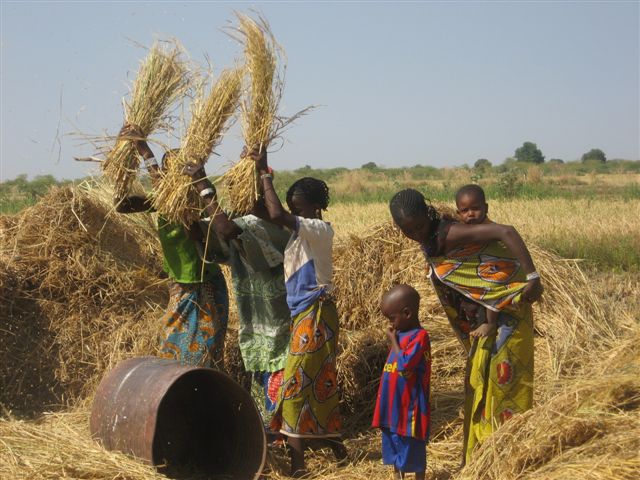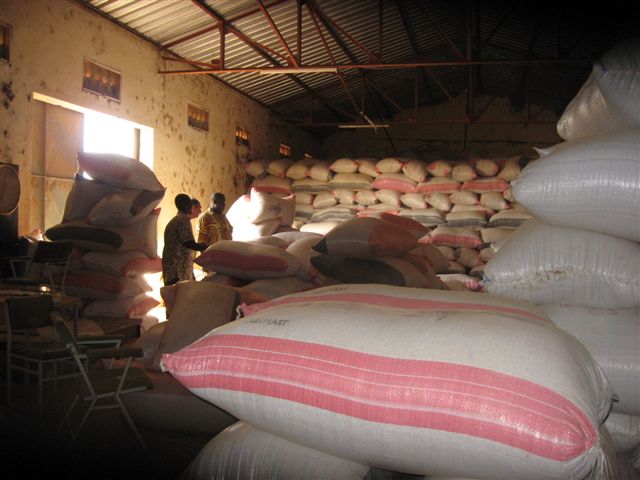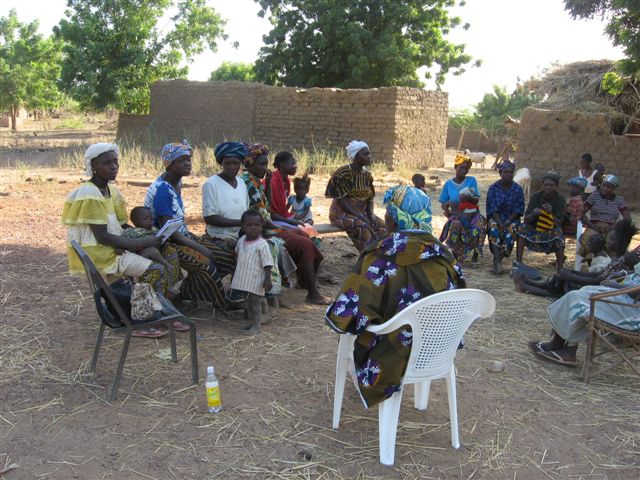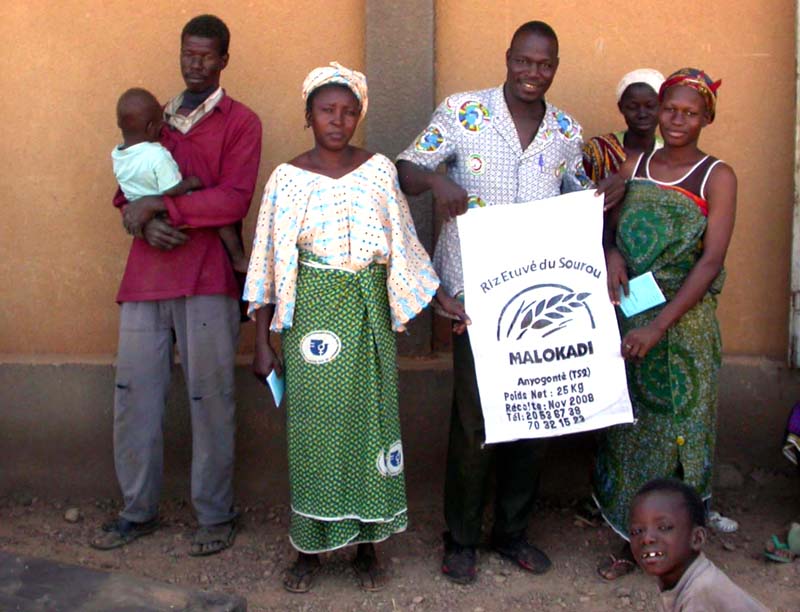A happy exile
We are pleased to publish today a field report from an external staff member and staunch ally of SEDELAN, Birgitta Amoroso. She spent a couple of weeks in November and December, in Nyassan, a small village in the middle of the rice fields in the Sourou river valley.
Awa, Delphine, Aminata and Claude – those are the names of some of the nearly 200 women of a battalion of pioneers, who have embarked upon a large scale steam-processing operation in the north western rice district, close to the border with Mali.
 Their fight? To conquerthe markets of Burkina’s largest cities, in particular Koudougou, the nearest. Their weapon: the rice of their fields, the strength of their arms and an extraordinary determination and working capacity. Their ammunition: cauldron and bowl, canvas and bike. Their objective: Earning an income by processing and adding value to the local rice grown by their families, in order, to provide for the basic needs of their house-holds, health care and education for their children.
Their fight? To conquerthe markets of Burkina’s largest cities, in particular Koudougou, the nearest. Their weapon: the rice of their fields, the strength of their arms and an extraordinary determination and working capacity. Their ammunition: cauldron and bowl, canvas and bike. Their objective: Earning an income by processing and adding value to the local rice grown by their families, in order, to provide for the basic needs of their house-holds, health care and education for their children.
The village of Nyassan is situated in the valley of the river Sourou, at its juncture with the sharp bend of river Mouhoun, the two bearers of the region, water, water nearly all year round. The cultivated land follows this vital spinal chord, in stretches of green which sprawl here and there, left and right, a bit like the paws of a giant crocodile drowsing in the Savannah.
 By a fortunate set of circumstances I found myself among these, women during my eighth stay in Burkina. I was accompanying the editor of abc Burkina, Maurice Oudet, Director of SEDELAN, during one of his many tours to all the four corners of the country. He is one of the initiators and promoters of the Sourou rice processing project and was going up to Nyassan to settle the last details around a 60 Mio CFA franc loan (approximately €100.000), just granted for the project by the MUFEDE , a bank geared to women and development. He was also to inspect the rice stores, where the raw rice is locked up as a security for the loan. A solid guarantee, if ever there was one,visible, tangible and even edible ! Far from the virtual, toxic securities for American sub-prime mortgages which are now infecting the real economies all over the world
By a fortunate set of circumstances I found myself among these, women during my eighth stay in Burkina. I was accompanying the editor of abc Burkina, Maurice Oudet, Director of SEDELAN, during one of his many tours to all the four corners of the country. He is one of the initiators and promoters of the Sourou rice processing project and was going up to Nyassan to settle the last details around a 60 Mio CFA franc loan (approximately €100.000), just granted for the project by the MUFEDE , a bank geared to women and development. He was also to inspect the rice stores, where the raw rice is locked up as a security for the loan. A solid guarantee, if ever there was one,visible, tangible and even edible ! Far from the virtual, toxic securities for American sub-prime mortgages which are now infecting the real economies all over the world
Soon called away to other duties and work sites, the Director of SEDELAN assigned me to a stay in Nyassan, a study retreat of some weeks, much improvised on the spur of the momentwhich enabled me to closely follow the rice processing work of the peasant women in t he valley.
Before the cock crows and the first beam of sunlight rises, Marie-Madeleine, Porégyédé, Odile and their teams are on their feet for their daily combat. going to the well, drawing and transporting water in 200 Litre barrels, collecting what fuel they can find, mostly maize stalks and peeled corn ears, starting the fire and preparing pots and cauldrons. Rarely they offer themselves the luxury of real wood, sold at 5000 CFA francs per cart-load (transported by mule from far afield). In their court-yards they work together, 2, 3 , 4 or more to keep the fire going under the large iron pots, to soak and sort the raw rice, eliminating floating empty grains, keeping a close watch on boiling water and rising steam, their bare feet in open sandals a few inches from the fire, while the hot vapours embalm heads and vision. They do not possess any graded measures, weights and scales, they rely on what their sensitive nose, accurate eye and infallible touch tell them and they do not fail. Where we would have armed ourselves with all possible and imaginable chrono-hygro-baro-thermometres, they just put a hand on a lid, they scrutinise the bubbles deep down their pots, they feel the sides of their cauldrons, to determine if heat and steam have actually permeated all the rice inside. And they always know when it is time!
After an initial steaming process, the rice is transferred to large clay pots and left to cool overnight. The next day a second steaming operation takes place and the rice is then poured out to dry on a large canvas spread on the ground. It is under close watch and stirred and turned over every 10 minutes. In this way one woman manages to produce 4, 8 or even 10 25kg bags of perfectly parboiled rice in one week!
Once the rice is dry it is transported to the mill Often loads of 20-40 kg, are fastened on the back of a rickety bike. Which one of us would ever manage the tour-de-force of the Burkina peasant woman : straddle a man, bike, wrapped up in the tight traditional, cotton sarong to the ankles, feet in tong sandals child tied to one back, steadying a huge basin on one head,the other on the handle-bar steering through country and village dirt tracks pedalling the 1-2 kms to the mill?? They deserve an Olympic medal for this feat alone..
The husking takes place in one of the few small village mills. The steamed (parboiled) grain comes out softer than the paddy rice grain straight from the field and the milling thus turns out to be less abrasive.The nutritious particles are spun towards the centre of the grain by the heat and as a result the processed rice is of higher quality. Much white rice, popular among Americans and urban consumers, is enriched post mortem with minerals and vitamins lost during milling). The husked grains are then winnowed. simply by pouring them down outdoors against the wind to sift away debris of remaining husks and bran. The bran is sold as an additive to animal feed and the husks are sometimes used for fuel for specifically designed processing stoves.
 Another vital asset: the collective effort. This army of new professionals in Nyassan quickly set up associations, which they continue to consolidate in order to form a large union. The names are significant and reflect the women spirit of community and solidarity : NAMANGADZANGA (= « Useful for everybody »), BENNAFAKATIA, SABARIKADI = «It is good to forgive »,or SONGTAABA = « Let us help each other». Prose and poetry get along well under their roof!
Another vital asset: the collective effort. This army of new professionals in Nyassan quickly set up associations, which they continue to consolidate in order to form a large union. The names are significant and reflect the women spirit of community and solidarity : NAMANGADZANGA (= « Useful for everybody »), BENNAFAKATIA, SABARIKADI = «It is good to forgive »,or SONGTAABA = « Let us help each other». Prose and poetry get along well under their roof!
However, it is not so easy to get organised, when only one or two women out of about thirty know how to read and write. Not so simple either to give the address of your organisation, when it does not yet have an office .other than under the first acacia tree to the left after the track turns at the chemist which is rarely deemed quite satisfactory by various administrative and public authorities. Easier said than done to co-ordinate, when the village has no electricity, post office or internet connection and when the one and telephone line is chronically jammed. .. Nevertheless, the associations decide to nominate, besides their president, secretary and treasurer, a Press Officer, a member in charge of information and communication. Excellent!
 At the four meetings held during my stay, thirty women or more turned up every time, notified through these informal channels that proved highly efficient. And other women joined in, all eager to pay their membership fee, receive their personal production log-book and take away the newly printed rice bags, sporting a nice logo and labelled MALOKADI ( The Good Rice), ready to be filled
At the four meetings held during my stay, thirty women or more turned up every time, notified through these informal channels that proved highly efficient. And other women joined in, all eager to pay their membership fee, receive their personal production log-book and take away the newly printed rice bags, sporting a nice logo and labelled MALOKADI ( The Good Rice), ready to be filled
When finally the time comes to to take our leave and depart from the valley, II can hardly suppress an urge to call back: ask for the road Fare well you too, Germaine, Eugénie, Fatimata and all your sisters on the road ahead. Fair wind to this great march of Burkina women on their way towards more personal, local and national self-sufficiency: food sovereignty, self-propelled development and work in dignity.
Their silhouettes , erect as Greek temple caryatids against the morning sky, carrying the heavy loads of rice on their magnificent heads as well as the hopes of an entire population vanish at last at the horizon, engraved in my memory.
At the time of publication of this newsletter, two trucks now leave every week for Koudougou, where the inhabitants greatly appreciate the rice from Nyassan, appropriately named ( in jula): « anyogontè » (simply The Best).
Florence, February 18, 2009
Birgitta Amoroso









